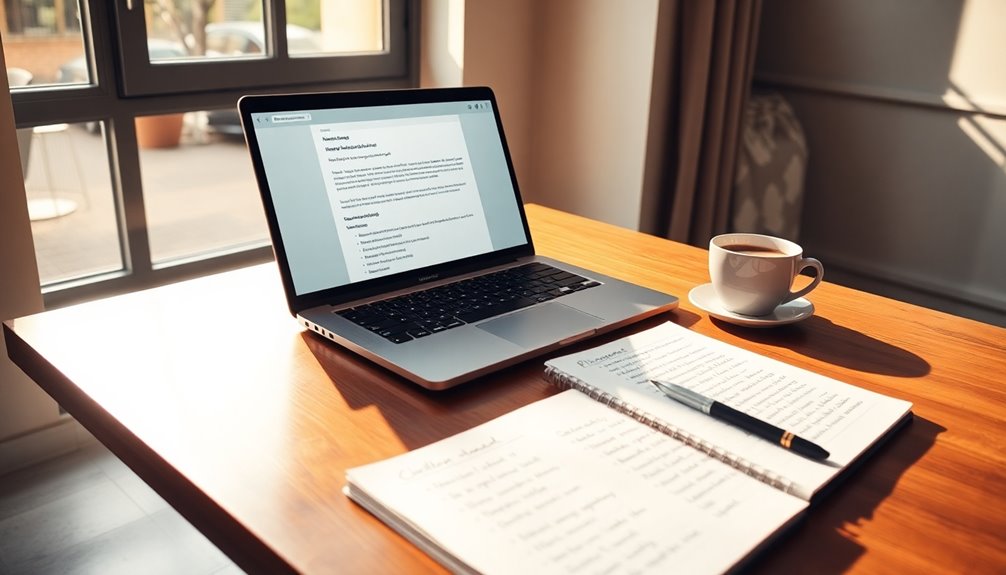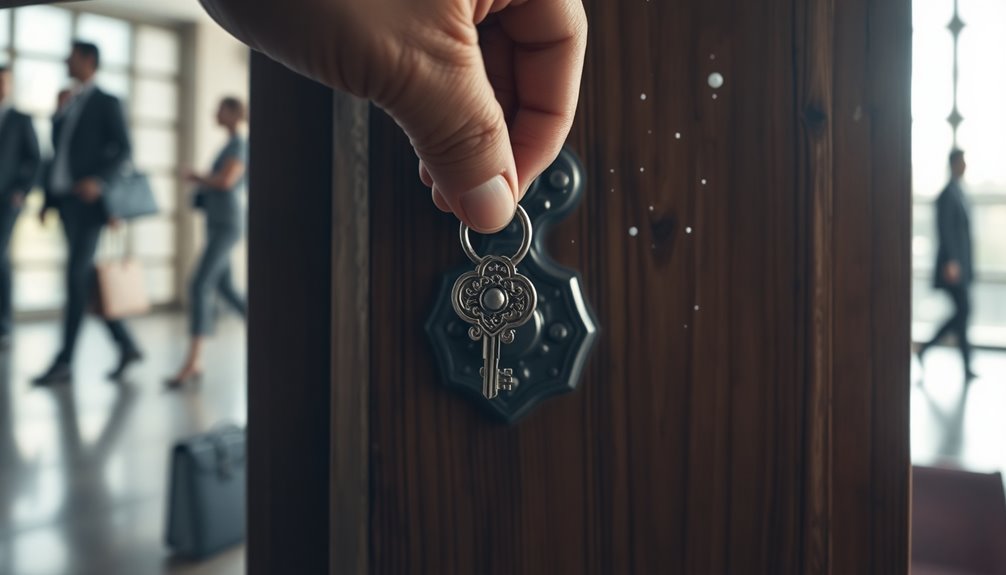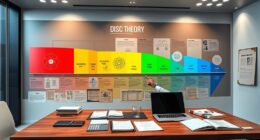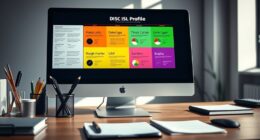To ace your senior associate management consulting interview, prep thoroughly and utilize the A-STAR(E) format when answering questions. Clearly articulate past achievements and highlight your alignment with the firm's culture. Don't forget to dress for success; business formal attire leaves a strong impression. Practice mock interviews to boost your confidence and refine your storytelling. Engaging in insightful, thoughtful questions shows your genuine interest and commitment. Lastly, follow up with gratitude to stand out. Trust us; this is just the tip of the iceberg—there's more to discover that can elevate your interview game!
Key Takeaways
- Master the A-STAR(E) format to structure responses, showcasing achievements and aligning them with the consulting firm's values and needs.
- Conduct thorough research on the firm's culture and recent projects to ask insightful questions during the interview, demonstrating genuine interest and engagement.
- Practice case interviews extensively to enhance analytical skills and build confidence in articulating thought processes clearly and effectively.
- Dress in business formal attire that reflects professionalism, ensuring your appearance aligns with the firm's culture and enhances first impressions.
- Follow up with personalized thank-you emails within 24 hours, reinforcing key points discussed and expressing enthusiasm for the opportunity.
Introduction to Job Interviews

Job interviews are crucial gateways to landing your desired role, and they're designed to assess your qualifications, skills, and overall fit within an organization. The interview process can be daunting, especially when you reach the final round, where you'll typically meet 3-4 senior-level consultants. This stage often emphasizes both case studies and behavioral questions, pushing you to demonstrate not just your technical skills but also your interpersonal abilities.
Behavioral questions are particularly important as they help interviewers gauge how you've handled various situations in the past. They often follow the A-STAR(E) format, prompting you to articulate your Actions, Situations, Tensions, Results, and Effects. By preparing detailed stories that reflect your experiences, you can effectively showcase your strengths and avoid redundancy in your responses across multiple interviewers.
To enhance your performance, engage in mental rehearsal before the interview and consider arriving early on the interview day. This can significantly boost your confidence and help you present your best self. Remember, each interview is an opportunity to demonstrate why you're the right fit, so approach it with clarity and purpose.
Preparing for the Interview

To ace your senior associate interview, start with thorough research and self-assessment. Tailor your resume and application to highlight your strengths and align with the firm's values. Lastly, use effective preparation techniques to ensure you're ready to impress with your insights and experience. Additionally, consider gaining insights on AI Ethicist Jobs to understand the ethical implications of AI technologies, which can be a crucial aspect in many consulting projects. Understanding advance directives can also provide valuable context when discussing client needs in sensitive situations. Furthermore, being aware of key trends in the consulting industry can help you articulate how your skills align with future demands.
Research and Self-Assessment
Thorough preparation is crucial for a successful senior associate interview, and that starts with in-depth research and honest self-assessment. Begin by diving into the consulting firm's culture, values, and recent projects. Understanding these elements can significantly enhance your fit during the interview process. Engage with current consultants at networking events to gather insights about their experiences and expectations, which can inform your preparation.
Next, conduct a thorough self-assessment. Identify your strengths and weaknesses through targeted exercises, and practice case interviews to hone your skills. Utilize the A-STAR(E) format to structure your self-assessment stories. This ensures you effectively highlight your past experiences and the results of your actions, making a strong case for your candidacy.
Finally, prepare thoughtful questions for the interviewers. These questions should demonstrate your knowledge of the firm and reveal your genuine interest in their work. This approach not only showcases your commitment but also engages the interviewers, making you a memorable candidate. By combining thorough research with honest self-assessment, you'll be well-equipped to impress during your senior associate interview.
Resume and Application Preparation
Crafting a compelling resume and application is essential for making a strong impression during your senior associate interview. Start by tailoring your resume to highlight relevant consulting experiences and skills. Use quantifiable achievements to demonstrate your impact in previous roles, which will resonate well in consulting interviews.
In your application materials, including your cover letter, reflect a deep understanding of the firm's culture and values. Show how you fit with their mission and work style. Incorporate the STAR (Situation, Task, Action, Result) method to clearly articulate your accomplishments and problem-solving abilities. This structured approach will be valuable during behavioral interviews.
Don't forget to include keywords from the job description in your resume and application. This will help you pass through Applicant Tracking Systems (ATS) and align your experiences with the role requirements. Additionally, ensuring that your resume features high-quality content can enhance your credibility and make a stronger impression on hiring managers. Finally, seek feedback on your resume and application from mentors or professionals in the consulting field. Their insights can help ensure clarity, conciseness, and overall effectiveness before submission. Nail your resume and application preparation, and you'll set yourself up for success in the interview process!
Interview Preparation Techniques
Effective interview preparation can significantly boost your chances of success in landing a senior associate position. Start by mastering interview preparation techniques that highlight your skills and experiences. Use the A-STAR(E) format to structure your responses to behavioral questions. Clearly articulate your Answer, Situation, Tension, Action, Results, and Effect to make a lasting impact.
Next, prepare a diverse set of stories to share during the interview. This helps avoid repetition across interviewers, making you more engaging and memorable. Research the firm's culture and values thoroughly, tailoring your responses to demonstrate your fit for the organization.
Don't forget about case interviews—practice solving them to sharpen your analytical skills. Engage in mental rehearsal of key points and prepare insightful questions to ask the interviewer. This not only boosts your confidence but also shows your genuine interest in the role.
Lastly, arrive at the interview location 15 minutes early. This gives you time to relax and mentally prepare, ensuring you're composed and ready to make a positive impression. Following these techniques will help you stand out in the competitive field of management consulting. Additionally, consider using puppy training classes as a model for structured learning and socialization, which can enhance your adaptability in dynamic interview environments.
Dressing for Success

When it comes to dressing for success, your attire plays a vital role in making a strong first impression. You'll want to choose professional outfits that reflect the seriousness of the role, with specific guidelines varying for men and women. Seasonal and casual variations should also be considered, ensuring you always look polished and confident. Additionally, remember that a well-groomed appearance can enhance your overall presence, similar to how essential oils for hair growth can promote a healthy look. Butter, like your attire, is a source of vitamins that can contribute to your overall well-being. Dressing appropriately can also demonstrate your awareness of professionalism and your understanding of the corporate culture.
General Attire Guidelines
Dressing for success in a management consulting interview is essential, as your attire can significantly influence the first impression you make. For the first round, aim for business formal attire that reflects your seriousness and respect for the opportunity. A well-fitted suit in neutral colors like navy, gray, or black is ideal. Pair it with a crisp dress shirt and a conservative tie if you're a man, or a tailored blouse if you're a woman. Additionally, consider how a polished appearance can enhance your overall confidence, much like choosing a hotel with a water park to elevate your vacation experience.
Keep accessories minimal and understated; avoid flashy jewelry that could distract from your overall look. Opt for classic pieces that enhance your appearance instead. Your shoes should be polished and professional—closed-toe dress shoes work best for women, while men should wear leather dress shoes that complement their suits.
Don't overlook personal grooming. Maintain a neat hairstyle and ensure your nails are clean and trimmed. Attention to detail in your appearance speaks volumes about your professionalism and confidence, especially during those long hours of interviews. Make it happen by showing that you take your presentation seriously; it's just as critical as your qualifications. Additionally, healthy boundaries in personal presentation can help you feel more confident and in control during the interview process.
Gender-Specific Attire Tips
Choosing the right attire for interviews is crucial, and it varies significantly between genders. For men, a well-fitted suit in neutral colors like navy or charcoal shows professionalism. Pair it with a crisp white or light blue shirt and a conservative tie to highlight your attention to detail. Don't forget your polished dress shoes—they're essential for completing your look.
For women, opt for tailored blazers paired with skirts or tailored pants in muted tones. A professional blouse will convey confidence and competence, while avoiding bright or distracting patterns keeps you focused. Footwear is just as important; closed-toe heels or flats that are comfortable yet professional will ensure you can perform at your best during the interview.
Keep accessories minimal and understated—think classic watches for men and simple jewelry for women that complements your outfit without being flashy. Lastly, grooming matters just as much as your clothes. Ensure your hair is neat, nails are clean, and you present a fresh appearance. This attention to detail reflects your professionalism and respect for the interview process.
Seasonal and Casual Attire
Selecting the right attire for a senior associate interview is essential, especially when considering seasonal factors and company culture. Opt for business formal attire, which typically includes a tailored suit, dress shirt, and polished shoes. This choice conveys a professional appearance that shows you're serious about the opportunity.
In warmer months, lightweight fabrics and lighter colors are more appropriate, while heavier fabrics and darker colors work well for colder seasons. Always steer clear of overly casual attire like jeans, sneakers, or t-shirts. These options can create a negative first impression and suggest a lack of respect for the interview process.
Accessories should remain minimal and professional—a classic watch or subtle jewelry can enhance your look without being distracting. Prior to your interview, research the firm's culture. Some consulting firms may embrace a more relaxed dress code, allowing slight variations in business casual attire. Just remember, even if the environment is more casual, your goal is to maintain a polished appearance that aligns with the company's values.
Mastering Interview Questions

Mastering interview questions is essential for standing out as a Senior Associate candidate. You'll want to prepare for common, behavioral, and situational questions while also being ready for industry-specific inquiries that showcase your expertise. By honing advanced questioning techniques, you can effectively convey your skills and fit for the role.
Common Interview Questions
Navigating the world of senior associate interviews can feel daunting, especially when it comes to common interview questions. You'll often face inquiries that assess your problem-solving skills and fit within the firm's culture. To tackle these effectively, master the A-STAR(E) format, which helps you craft compelling narratives around your Answer, Situation, Tension, Action, Results, and Effect.
Prepare a diverse set of stories that highlight various skills and experiences relevant to the consulting role. Avoid repetition to keep your responses fresh across different interviewers. If you're aiming for firms like Bain or BCG, ensure your answers align with their culture; this can sway the interviewer's perception of your fit.
Additionally, don't underestimate the power of detailed research on common case interview questions. Practicing these will sharpen your analytical skills and boost your confidence for the final rounds. Lastly, develop insightful questions for your interviewer. This not only demonstrates your understanding of the firm's challenges but also showcases your genuine interest and proactive mindset, setting you apart from other candidates.
Behavioral and Situational Questions
Behavioral and situational questions are often a crucial part of senior associate interviews, and they require you to provide concrete examples that showcase your skills and experiences. One thing to remember is to utilize the A-STAR(E) format—Answer, Situation, Tension, Action, Results, and Effect. This structure helps you articulate your responses effectively, demonstrating your problem-solving skills.
Prepare a diverse set of stories to answer these questions, highlighting different experiences and outcomes. This approach prevents repetition and keeps your responses engaging for each interviewer. Tailoring your answers to align with the firm's culture and values also enhances your fit with the organization, making your responses resonate more.
Practice your stories out loud to build confidence and ensure smooth delivery during the interview. Mental rehearsal of key points can significantly improve your performance. Furthermore, arriving 15 minutes early and preparing insightful questions not only shows your interest but also allows you to establish a positive rapport right from the start. Mastering these elements will help you tackle behavioral questions and excel in your case interview, setting you apart from other candidates.
Industry-Specific Questions
Industry-specific questions play a vital role in senior associate interviews, particularly in management consulting. These questions often gauge your industry knowledge and analytical skills, focusing on sector trends, regulatory impacts, and competitive dynamics. To stand out, prepare to discuss relevant case studies that showcase your ability to apply consulting frameworks to real-world scenarios.
Familiarizing yourself with key performance indicators (KPIs) specific to the industry can significantly enhance your insights and recommendations during the interview. Understanding these metrics will allow you to articulate your thoughts more clearly and demonstrate your grasp of the industry's landscape.
Engaging with current events and recent changes in the sector can also give you a competitive edge. This proactive approach not only helps you discuss relevant issues but also shows your genuine interest in the industry.
Finally, be ready to ask thoughtful questions about the firm's industry focus. This not only clarifies your fit within the organization but also highlights your understanding and enthusiasm for the sector. By mastering these industry-specific questions, you'll position yourself as a well-prepared candidate ready to tackle the challenges of a senior associate role.
Advanced Question Techniques
When preparing for senior associate interviews, mastering advanced question techniques can set you apart from other candidates. Start by using the A-STAR(E) format—Answer, Situation, Tension, Action, Results, Effect—to structure your responses. This method ensures clarity and impact, making your storytelling compelling.
Prepare a diverse range of personal anecdotes that highlight your experiences with team members and the development of a new product. This variety will prevent repetition and enhance your visibility during interviews. Additionally, develop unique frameworks for structuring your case responses. This not only differentiates you but also showcases your creative problem-solving abilities.
Don't underestimate the power of probing questions. Tailor these to specific cases, demonstrating your deep understanding of client needs. This enhances the quality of your analysis and shows your proactive approach.
Lastly, engage in continuous self-assessment through mock interviews. This practice will help you refine your techniques, address weak areas, and build confidence. By implementing these advanced question techniques, you'll position yourself as a standout candidate ready to tackle the challenges of a senior associate role in management consulting.
Asking Insightful Questions

Asking strategic questions during your interview can really set you apart and show your genuine interest in the role. Focus on inquiries that reveal insights about the firm's culture, career growth, and recent projects, as these will spark engaging conversations. Closing with thoughtful questions not only reinforces your enthusiasm but also helps you assess if the firm aligns with your career goals.
Strategic Questions to Impress
Strategic questions can significantly enhance your interview experience, allowing you to stand out as a candidate. Preparing thoughtful inquiries shows your genuine interest in the firm and the role, helping to establish a strong rapport with your interviewers. In the third round of interviews, where competition is fierce, insightful questions can set you apart.
Consider asking about the firm's culture or recent projects. This not only demonstrates your engagement but also showcases your knowledge of the firm's values. Tailor your questions based on specific insights from your research, such as recent news or strategic initiatives, to further impress your interviewers.
Additionally, inquire about the potential career trajectory within the firm or opportunities for professional development. This signals your long-term interest and commitment to growth, which firms value in candidates. Engaging your interviewers with these strategic questions can also provide you valuable insights into the firm's work environment and expectations. Ultimately, this will aid your decision-making process if an offer is extended, ensuring you find the right fit for your career aspirations.
Closing Questions
Engaging your interviewers with insightful closing questions can leave a lasting impression and reinforce your interest in the role. Make sure to prepare questions that go beyond the basics, as this demonstrates your genuine curiosity and strategic thinking. For instance, you might ask about the firm's culture and team dynamics, or inquire about specific challenges the firm is currently facing. This shows you've done your research and are serious about fitting into their environment.
In the Second Round, one of the things you could explore is opportunities for career development within the firm. This not only indicates your long-term commitment but also highlights your desire to grow alongside the organization.
Tailoring your questions to the specific firm and the interviewers can further enhance your connection. By doing so, you'll not only stand out from other candidates but also create a more memorable interaction. Remember, thoughtful closing questions can significantly influence hiring decisions in your favor, making you a more appealing candidate. Embrace this opportunity to engage deeply and illustrate why you're the perfect fit for the role.
Effective Communication and Presentation

When you're preparing for your interview, crafting the perfect response is key to conveying your experiences effectively. Remember, your body language and confidence also play a crucial role in how you present yourself. Together, these elements can significantly enhance your communication and leave a lasting impression on your interviewers.
Crafting the Perfect Response
How can you ensure your responses resonate with interviewers during a senior associate interview? Start by using the A-STAR(E) format: Answer, Situation, Tension, Action, Results, and Effect. This structure helps you clearly convey your experiences and keep your responses focused. Prepare a diverse set of stories that showcase different competencies. This way, you won't sound repetitive in each round interview, keeping your answers fresh and engaging.
Next time you practice, tailor your communication style to align with the firm's culture and values. This shows you understand their expectations and enhances your fit for the organization. Don't forget to rehearse your responses mentally; this boosts your confidence and clarity, allowing you to articulate your thoughts succinctly under pressure.
Additionally, engage with your interviewers by preparing insightful questions that reflect your genuine interest in the role and the firm. This proactive approach not only demonstrates your communication skills but also adds depth to your conversations. By crafting the perfect response, you'll leave a lasting impression that sets you apart from other candidates.
Body Language and Confidence
Your verbal responses are only part of the equation in a senior associate interview; body language plays a pivotal role in how you're perceived. Maintaining an open posture—like uncrossed arms and legs—projects confidence and approachability, which are crucial for making a positive impression.
Eye contact is essential; studies show that consistent eye contact enhances trust and engagement, signaling your confidence and attentiveness. Remember to practice power poses, such as standing with hands on hips, for a few minutes before the interview. Research by Amy Cuddy indicates this can significantly boost your self-confidence and reduce anxiety.
Your tone of voice also matters. Speak clearly and at a moderate pace to convey confidence and ensure your points resonate with the interviewers. Lastly, incorporate non-verbal cues like nodding and using hand gestures to emphasize your points. These techniques not only enhance engagement but also make your responses more memorable.
Post-Interview Strategies

After your interview, it's crucial to follow up with your interviewers to express gratitude and reaffirm your interest in the position. Handling offers and rejections with professionalism sets you apart, showcasing your maturity in the process. Let's explore how effective communication post-interview can enhance your chances and prepare you for what comes next.
Follow-Up Communications
A thoughtful follow-up communication can significantly enhance your chances of landing the senior associate position. Sending a personalized thank-you email to each interviewer within 24 hours shows your appreciation and reinforces your interest in the role. In your message, mention specific topics you discussed during the interview. This demonstrates your attentiveness and helps keep the conversation fresh in their minds.
If you received any feedback during the interview, address those points in your follow-up. This illustrates your commitment to improvement and adaptability, traits that consulting firms highly value. Use this opportunity to reiterate your key strengths and how they align with the firm's needs. Reminding them of your relevant skills can keep you top-of-mind for decision-makers.
While maintaining a professional tone, don't hesitate to express your enthusiasm for the role. A positive attitude can resonate well with interviewers, encouraging further engagement. Your follow-up isn't just a courtesy; it's a strategic move to solidify your candidacy. By crafting a thoughtful message, you can leave a lasting impression that could set you apart from other candidates.
Handling Offers and Rejections
Receiving an offer is an exciting milestone, but it's important to handle it with care. Start by expressing gratitude to the firm, and take the necessary time to evaluate the terms of the offer. Ensure it aligns with your career goals and personal values before making a decision.
If you face rejection, don't be discouraged. Instead, reach out to the interviewers for constructive feedback. This can help you identify areas for improvement, making you a stronger candidate in future interviews. Post-interview, continuously self-assess your performance to pinpoint strengths and weaknesses.
Maintain a positive attitude throughout the process. Remember, mixed evaluations might indicate interest from some interviewers, suggesting there's potential for future opportunities. Even after a rejection, keep in touch with the firm. Demonstrating ongoing interest and professionalism can leave a lasting impression, paving the way for future roles.
Handling offers and rejections effectively not only enhances your career prospects but also showcases your resilience and commitment to growth. Embrace each experience as a valuable learning opportunity on your journey to becoming a Senior Associate.
Remote Interview Technology Trends

As remote interviews become the norm, it's crucial to understand the digital platforms making them possible. You'll also want to consider how cross-cultural communication nuances affect your performance and how emerging technologies can enhance your interview experience. Staying updated on these trends will give you a competitive edge in the hiring process.
Digital Interview Platforms
With the rise of digital interview platforms, employers are embracing new technologies to enhance their hiring processes. In fact, as of 2023, 75% of employers now use video interviewing technology. These platforms come equipped with features like AI-driven assessments, real-time analytics, and customizable interview templates, all designed to improve candidate evaluation.
Additionally, many platforms offer integrated scheduling tools, making it easy for you to book interview slots that fit your schedule. This not only enhances your experience but also streamlines the entire hiring process. Research indicates that remote interviews can reduce the time to hire by up to 50%, allowing companies to quickly identify and onboard top talent in a competitive market.
With the shift to remote work, it's worth noting that 67% of candidates prefer virtual interviews. This trend underscores the importance of adaptability in recruitment strategies. As you prepare for your senior associate interview, familiarize yourself with the digital tools used by the firm. Understanding the platform can give you a significant edge, allowing you to focus on showcasing your skills rather than navigating technology. Embrace these changes, and you'll set yourself up for success.
Cross-Cultural Communication Nuances
Understanding cross-cultural communication nuances is essential for navigating remote interviews effectively. With 70% of communication being non-verbal, you need to be aware of gestures and expressions that might differ across cultures. Misinterpretations can lead to misunderstandings, so pay close attention to these subtleties.
Research indicates that 86% of employees and executives attribute workplace failures to ineffective communication. Therefore, honing your communication skills is vital. Virtual platforms like Zoom and Microsoft Teams offer features like real-time translation and closed captioning, which can help bridge language gaps during interviews.
However, don't underestimate the challenges; a study shows that 51% of remote workers feel less confident in their communication abilities. To stand out, practice using clear and concise language tailored to your audience. Additionally, consider utilizing cultural assessment frameworks to better understand your interviewers' backgrounds and expectations. This preparation can significantly improve your interaction and rapport, making you a more appealing candidate. By embracing these cross-cultural communication strategies, you'll position yourself for success in remote interviews.
Emerging Interview Technology Trends
Emerging interview technology trends are transforming the remote hiring landscape, making the process more efficient and engaging. You'll notice that AI-driven tools are becoming essential for candidate assessment. These tools analyze not just your verbal responses but also your non-verbal cues, like facial expressions and body language, giving interviewers deeper insights into your fit for the role.
Video conferencing platforms have evolved significantly, now offering features like real-time feedback, collaborative whiteboards, and virtual breakout rooms. This interactivity allows you to showcase your skills more effectively. Plus, the integration of scheduling tools with these platforms means you can manage your availability seamlessly, reducing the back-and-forth often associated with setting up interviews.
Another exciting trend is the use of virtual reality (VR) and augmented reality (AR) for immersive interview experiences. You may find yourself engaging in simulated case studies within a virtual environment, which can really bring the interview to life.
Lastly, don't overlook the importance of cybersecurity. Companies are prioritizing secure platforms to protect sensitive discussions and your personal information, ensuring a safe interview experience. Stay ahead by familiarizing yourself with these trends!
Confidence and Mindset

Confidence is key to acing your interview, and building it starts with preparation. By using inspirational strategies and mental rehearsal, you can strengthen your self-assurance and approach the interview with a positive mindset. Remember, your confidence not only reflects your capabilities but also influences how interviewers perceive you.
Building Unshakeable Confidence
Building unshakeable confidence is essential for acing your senior associate interview. Start by mastering the A-STAR(E) format for behavioral questions. This structured approach helps you articulate your experiences clearly, boosting your self-assurance as you answer. Additionally, engage in mental rehearsal of key points. Research shows that visualizing your success can significantly enhance your performance in high-pressure situations like interviews.
Arriving 15 minutes early to the interview is another strategy that pays off. Not only does it demonstrate professionalism, but it also gives you a chance to acclimate to the environment, which reinforces your confidence. Prepare insightful questions for your interviewers; this not only clarifies your fit with the firm but also showcases your genuine interest, enhancing your confidence in engaging meaningfully.
Lastly, participate in activities that promote relaxation and stress management, such as mindfulness or light exercise. These practices improve your overall mental clarity and confidence levels leading up to the interview. By implementing these strategies, you'll build a strong foundation of confidence that can make a significant difference in your performance during the interview.
Inspirational and Motivational Strategies
A positive mindset is crucial for navigating the challenges of a senior associate interview. Engaging in activities that promote relaxation, like exercise or mindfulness, can significantly boost your confidence and enhance your performance under pressure. These practices help manage stress, allowing you to approach the interview with a clear head.
Mental rehearsal techniques are another powerful strategy. Visualizing yourself successfully navigating the interview can bolster your self-assurance and reduce anxiety, leading to a more polished delivery. When it comes to behavioral questions, mastering the A-STAR(E) format will not only help you organize your thoughts but also instill confidence as you articulate your experiences effectively.
Prepare insightful questions for your interviewers, demonstrating genuine interest in the role. This not only shows confidence but also allows you to assess if the firm aligns with your career goals. Lastly, remember that first impressions matter. Dressing professionally and arriving early sets a proactive tone and reinforces your confidence right from the start. By integrating these inspirational and motivational strategies, you'll position yourself for success in your senior associate interview.
Practice With Mock Interviews

Practicing with mock interviews is crucial for your preparation as a candidate. It helps you simulate the real interview environment, allowing you to refine your answers and boost your confidence. By incorporating key frameworks and recording your sessions, you can effectively identify areas for improvement and enhance your overall interview performance.
Essential Items and Preparation
How can you ensure you're fully prepared for your senior associate interview? Engaging in mock interviews is key. Practicing with peers or mentors not only sharpens your case and behavioral interview skills but also builds your confidence. This collaborative approach helps you pinpoint weaknesses in your techniques, allowing you to address them before the big day.
Use the A-STAR(E) format during these mock sessions to structure your behavioral responses effectively. This method ensures you cover all critical components, making your answers more compelling. Recording your mock interviews can provide invaluable insights into your body language, tone, and pacing, helping you make targeted improvements.
Simulating real interview conditions—like time constraints and pressure—will further prepare you for the high-stakes environment of a final round interview. By putting yourself in these situations, you'll learn to manage stress and think on your feet, both crucial for success.
Incorporating these strategies into your preparation will boost your confidence and enhance your performance. So, dive into those mock interviews, and you'll find yourself ready to impress in your senior associate interview!
Final Preparation Steps
Building on your mock interview experiences, it's time to focus on final preparation steps that can elevate your performance. Engaging in mock interviews with peers or mentors helps simulate the interview environment, allowing you to identify your strengths and weaknesses. This practice is crucial for refining your approach.
Tackle a variety of case studies and behavioral questions to enhance your adaptability and confidence. Familiarity with different question types can make a significant difference on interview day. Consider recording your mock interviews; this enables you to conduct self-assessments, refining your responses and improving your delivery.
Incorporating feedback from experienced consultants during these sessions is invaluable. They can provide insights into industry expectations, helping you tailor your responses for specific firms. Don't underestimate the power of practice—allocate time for multiple mock interviews before your final round. This repetition can significantly increase your comfort level and readiness, paving the way for improved performance.
Ultimately, the more you practice, the more prepared you'll feel. So take these final preparation steps seriously, and you'll walk into that interview room ready to impress!
Interview Structure and Flow

The final round of interviews in management consulting is a critical step that can determine your future with the firm. Typically, these interviews occur at the firm's office and involve 3-4 consultants who will lead you through a mix of case studies and behavioral questions. This format mirrors what you experienced in the first round but with added intensity.
Expect the interviewers, often senior-level consultants, to emphasize behavioral and fit questions. They'll want to gauge your soft skills and how well you align with the firm's culture. One of the interviews may focus exclusively on behavioral questions, giving you the chance to showcase your interpersonal skills and cultural fit.
When tackling case studies, be prepared for a broader scope that may touch on profitability as well as issues pertinent to the non-profit and government sectors. Interviewers might use stress tests to see how you perform under pressure, so stay composed. Tailoring your responses to reflect the firm's values and expectations is crucial, as it enhances the overall impression you leave behind. Stay focused, and let your preparation shine through.
Key Takeaways for Success

Success in the final round of interviews hinges on your ability to showcase both your technical skills and cultural fit. Master the A-STAR(E) format for behavioral questions. This structured approach—Answer, Situation, Tension, Action, Results, and Effect—helps you deliver impactful responses that resonate with interviewers. Prepare diverse stories to avoid repetition. Each interviewer may connect differently with your experiences, so having a range of examples keeps the conversation engaging.
Conduct thorough research on the firm's culture. Engaging with consultants during campus presentations can give you insights that will help tailor your responses, showcasing your genuine fit with the organization. Arriving 15 minutes early demonstrates punctuality and allows you time for mental rehearsal, boosting your confidence before the interview begins.
Finally, prepare insightful questions for your interviewers. This not only clarifies your fit within the firm but also highlights your interest in the role and fosters a two-way dialogue. By combining these strategies—focusing on structured responses, diverse storytelling, cultural alignment, punctuality, and engaging questions—you'll position yourself as a strong candidate ready for the challenges of a Senior Associate role in management consulting.
Encouragement and Final Thoughts

As you prepare for your Senior Associate interview, remember that embracing both the challenges and opportunities ahead can make a significant difference in your performance. Engaging in activities that promote relaxation and stress management will help you maintain focus and composure. This balance is crucial during high-pressure interviews.
Don't forget to prepare insightful questions for your interviewer. This not only shows your genuine interest in the role but also helps you gauge the firm's culture and how you might fit in. First impressions matter, so dress professionally and exude confidence from the moment you walk in.
Continuous self-assessment is key. Reflect on feedback from past interviews to identify areas for improvement and refine your approach. This proactive mindset will elevate your chances of success. Additionally, leveraging insights from experienced consultants can greatly enhance your preparation. Their guidance can help you feel more confident and ready for anything that comes your way.
Ultimately, believe in yourself and your abilities. You've invested time and effort into this journey, and now it's time to shine. Trust your preparation, stay positive, and approach the interview as a valuable opportunity for growth. You've got this!
Frequently Asked Questions
How Do You Ace a Senior Management Interview?
To ace a senior management interview, focus on your storytelling. Use the A-STAR(E) format to structure your responses clearly. Prepare diverse anecdotes that showcase your skills without sounding repetitive. Understand the firm's culture and tailor your answers to align with their values. Arrive early, mentally rehearse your key points, and have insightful questions ready. Lastly, engage in stress management techniques to maintain calmness, boosting your confidence and overall performance.
How to Crack a Management Consultant Interview?
To crack a management consultant interview, start by mastering the A-STAR(E) format for behavioral questions. Prepare diverse stories that highlight your skills and experiences, avoiding repetition. Research the firm's culture and engage with current consultants to align your responses with their values. Develop strong casing skills through practice, and arrive early on interview day. Mentally rehearse key points and prepare insightful questions to show your genuine interest and confidence.
How to Ace a Mckinsey Case Interview?
To ace a McKinsey case interview, you need to structure your approach clearly from the start. Focus on client constraints and implementation timelines to make a strong first impression. Use unique frameworks and ask probing questions to showcase your critical thinking. Master the A-STAR(E) format for behavioral questions, and practice diverse case scenarios to show versatility. Engaging in mock interviews with experienced consultants can also boost your confidence and skills.
How Difficult Are Consulting Case Interviews?
Consulting case interviews are notoriously difficult. You'll face complex scenarios that require structured problem-solving and strong analytical skills. Firms like McKinsey, Bain, and BCG focus on mastering key components, including opening, structuring, and closing cases. Additionally, stress tests will challenge your ability to perform under pressure. It's crucial to blend analytical prowess with interpersonal skills, as behavioral aspects play a significant role in how you handle these challenging assessments.
Augustus is the visionary leader and Editor-in-Chief of Personality-Test.net. With an unwavering commitment to quality and authenticity, he oversees all content, ensuring it enlightens and empowers our audience. Augustus believes deeply in the transformative power of self-awareness and is dedicated to making Personality-Test.net a beacon for those on a journey to understand themselves better.










